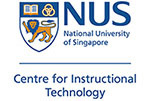What’s New
We Are NUS: 60 fascinating vignettes of people and everyday life by alumnus Yeo Tze Yang

Artist and NUS alumnus Yeo Tze Yang (Arts ’19) spent about two years to complete the 60 paintings constituting this installation.
Visitors to the newly-refurbished NUS Central Library would have chanced upon a brand new art exhibition, brightly installed at the entrance foyer. Launched virtually on 22 Feb, the visual display comprised 60 smaller art pieces, depicting people and scenes from everyday life in NUS, and presenting a microcosm of the vibrant and extensive NUS community.
Painted by artist and NUS alumnus Mr Yeo Tze Yang, the art pieces took around two years to complete, in light of COVID-19 challenges. The Southeast Asian Studies graduate from the Class of 2019 at the Faculty of Arts & Social Sciences was selected to work on this commissioned collection.
Gathering a diverse yet collegial community
Baby steps towards putting together this exhibition started in 2020, as the NUS community banded together during the early days of the pandemic. A series of virtual get-togethers called “NUS OK’ or ‘NUS, Our Kampung” was organised for the community to stay in touch. “We Are NUS: The People and Everyday Life of a University” built on this to celebrate the treasured bonding and shared experience.
In the spirit of capturing the zeitgeist of the NUS community, staff, students and contractors were selected through an open call, along with iconic scenes from various corners of the campuses.

The art exhibition, consisting of 60 smaller paintings, is located at the NUS Central Library foyer.
Said Tze Yang, “I painted a diverse range of people from different backgrounds, faculties and offices. Some have spent only a couple of years in NUS. Some have spent almost half a century. Everyone's story is unique – for some, an NUS education was a first in their family. For others, NUS was a workplace where they found friendship and meaning. Everyone's experience of the University is different.
“The project kickstarted with a vision in mind, to fill three walls with small paintings of the people, places and things that make up NUS. The University is a large institution, with so many facets, corners and nitty-gritty that called for such a display format.”
In order to bring out the essence of the people he painted, Tze Yang said he adopted the approach of painting them in a setting where he engaged them in direct conversation, citing two Asian artists, Thailand’s Navin Rawanchaikul and China’s Liu Xiaodong, who are known for this approach.
A sensitive and perceptive eye
Tze Yang’s talent extends beyond the artistic – he has the ability to connect with others to help them relax, feel comfortable and draw out their stories, bringing out different sides of people hitherto unseen.
“We had a really intense conversation on weighty subjects such as politics, privilege and purpose during the portraiture session,” said Associate Professor Daniel Goh, NUS Associate Provost (Undergraduate Education).
“That was how he painted me, wisened and wizened, with the severe frown that I often carry on my face when I am alone with my thoughts of the issues I wrestle and memories of the good fight I tried to fight. Tze Yang peeked into my inner struggles and painted it.”

Associate Professor Daniel Goh, NUS Associate Provost (Undergraduate Education), alongside his portrait at the Central Library Foyer.
This sentiment was also echoed by Ms Daphne Chua who works at NUS Business School. “We chatted over various topics, such as art versus design, family backgrounds, personalities, personal setbacks, and mental health, which I have never openly shared with anyone throughout my two years of work in NUS. It was rare to connect with someone as understanding as Tze Yang, who held space to embrace my thoughts and vulnerability without judgment,” said Daphne who has a background in visual arts.
Daphne also recounted how Tze Yang’s patience and discipline resonated with her, sharing an interesting snippet. Tze Yang had painted her portrait twice because he was not satisfied with the first iteration. However, she loved both portraits because they represented his own time, effort and unique perspective.
“This experience made me feel incredibly seen and appreciated as a person, rather than what I can simply produce,” she added.
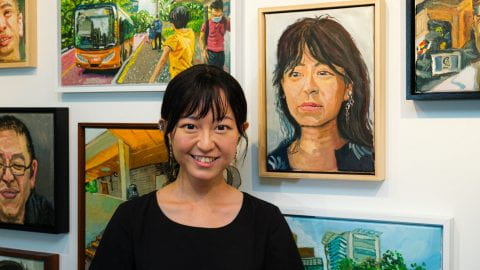
Ms Daphne Chua felt that the portrait painting experience had made her feel incredibly seen and appreciated as a person.

To Uncle Wong, who mans the drinks stall at Frontier, NUS is a place where he has built many close friendships through his many years of work.
Also part of the exhibition is a familiar face to those who frequent the canteen at Faculty of Science – Uncle Wong, who mans the drinks stall at Frontier. To Uncle Wong, who has been a steadfast presence in NUS since 1996, the University represents a place where he has met many people and developed close friendships with them. He described the painting process as “relaxing”, where he was able to chat with Tze Yang and answer his questions. It is Uncle Wong’s hope that “current students or alumni will reminisce about their time in NUS, when they see the painting of my likeness”.
Celebrating a community
Associate Professor Erle Lim, NUS Vice Provost (Teaching Innovation & Quality), a member of the committee involved in spearheading this project, shared, “I am very proud to see the project come to fruition. We hope that this exhibition can convey how special NUS is, that we are more than a place of study for the community – we are a family.”
For Tze Yang, as an alumnus and the artist behind this project, the collection of paintings represents his hope that it will “serve as a reminder of what makes a University special, beyond the newspaper headlines and trophies. These tiny moments and stories of people are what make this institution matter so much to many of us over its many decades of existence”.
Even as one steps away from the exhibition, the NUS story continues. The visual tapestry of NUS will evolve and transform, as new experiences are lived, and exciting discovery moments celebrated in the years to come.
Take a virtual tour of the art gallery here or visit the gallery and take wefies or selfies with the paintings at the photo booth.
You can also catch a short video on what Tze Yang and his subjects said about their experience here.
This story first appeared on NUSNews on 22 February 2022.
Meet the content creators who are redefining online learning

NUS' geNiUSchannel and geNiUSbooks serve as online learning resources by and for the NUS community (stock image taken before the pandemic)
From delving into the world of eggs to executing a cardiopulmonary bypass, online learning is taking on exciting new forms.
Increasingly, we are seeing a new wave of interactive eBooks and engaging video vignettes that push the envelope of learning on LumiNUS, NUS’ Learning Management System.
In a bid to catalyse more of such innovative digital education content in its geNiUSworld multimedia repository, NUS launched the inaugural geNiUSchannel and geNiUSbooks 2021 competition to recognise the most creative video and eBook resources produced by the NUS community.
Speaking at the competition, Associate Professor Erle Lim Chuen Hian, NUS Vice Provost (Teaching Innovation & Quality), said the use of the word ‘geNiUS’ is aspirational. “Rather than saying that we are all geniuses…we hope to become more intelligent and clever as we share materials,” he said.
He added that he hopes the competition encourages staff and students to explore the functions in the geNiUSworld platform. “I think you will be just as surprised as I have been by the creations that we are going to highlight.”

The inaugural geNiUSchannel and geNiUSbooks competition encourages NUS educators and students to create video vignettes and interactive ebooks, and honours the most creative video and eBook resources produced by the NUS community.
Professor Bernard Tan, NUS Senior Vice Provost (Undergraduate Education) and Shaw Professor in Information Systems and Analytics, said that geNiUSworld is an integral part of the university's technology-enhanced learning initiative.
Recognising that learning in the future will be an amalgamation of physical and online experiences, he added, “Moving forward, geNiUSchannel and geNiUSbooks would be a great resource for our colleagues – many of whom would be developing blended learning modules under our Blended Learning 2.0 initiative.”
For Associate Professor Soo Yuen Jien of the NUS School of Computing, who presided as one of the competition judges, what struck him was the sheer quantity and impressive quality across all the competition entries.
“It was certainly very challenging for me to pick the top winners in each of the categories,” shared Assoc Prof Soo, who is also the director of the NUS Centre for Development of Teaching and Learning (CDTL).
Here are some of the winning ideas.
geNiUSchannel Top Prize
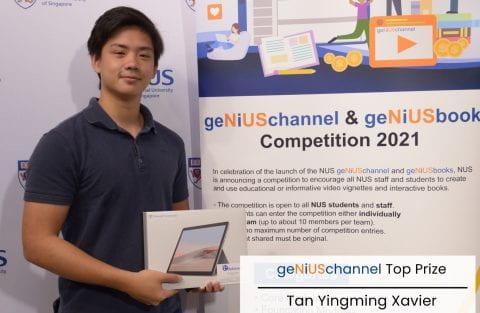
Xavier’s team’s project elucidates the under-researched topic of the impact on the marine environment that undersea cable networks have.
The Internet – Submarine Cables
We have come to rely heavily on the internet for business and pleasure, especially during this pandemic where many aspects of daily life have shifted from physical to virtual mode.
Yet unbeknown to many, the network relies on over a million kilometres of transatlantic undersea cables to transfer data across continents at the speed of light. These cables often come at a cost to the marine environment, such as disturbance to the seabed as they are laid.
Presented as a skit, the explainer video sheds light on an under-researched topic.
“We hope that this video is one of many to inspire generations of viewers and students to not only create their own content, but also to be appreciative of the world we have and not take things for granted,” said Xavier Tan, one of the five members of Team Radial 256 who hail from different faculties.
“If we do not maintain a balance between rapid urbanisation and conservation, we are likely to face irreparable losses in the coming years.”
geNiUSchannel Best Teacher Award

Dr Paranjothy strives to make class content accessible to learners, especially for students of the 21st century.
Principles of Cardiopulmonary Bypass
When Dr Suresh Paranjothy jumped into the world of video-making for learning in early 2021, he found the process “quite fun”.
“We need to make education interesting, entertaining and accessible to our students. This is what I tried to accomplish with these e-learning videos,” said the Assistant Professor from the Department of Anaesthesia at the Yong Loo Lin School of Medicine.
Explaining how teaching and learning strategies should evolve, he noted that the current crop of students learns better by watching video tutorials than through traditional books and lectures.
The feedback from his students has been positive, and Dr Paranjothy observed that they have been able to quickly pick up the important points through his videos.
“Videos and e-learning are a great way to deliver education to students… It was challenging at first and quite time-consuming, but the end-product was worth the effort.”
geNiUSchannel People's Choice Award

MERJA sheds light on the ownership process and legal implications of purchasing property.
Purchasing Private Properties in Singapore: Legal Matters
Buying a property is a big financial decision. But not everyone is familiar with the ownership process and its implications.
After learning about these in a compulsory law module as part of their real estate studies programme at NUS Business School, the 5-member Team MERJA thought many could benefit from their newfound knowledge. So they produced an animated video, which provides a quick explainer on the steps involved when purchasing a completed private property, the two types of co-ownership and their implications, and how matrimonial property may be divided upon separation or divorce.
geNiUSbooks Top Prize
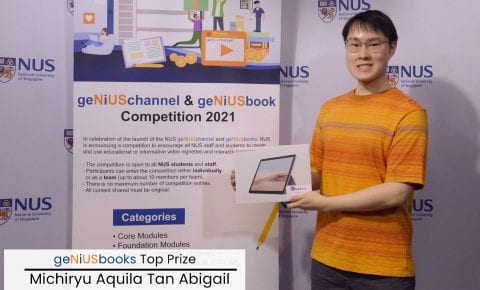
Aquila Tan’s team, The Egg Enthusiasts, created their educational eBook to engage young children through hands-on experiments.
Egg-ceptional Wonders!
As one of the world’s most versatile foods, eggs are widely consumed and enjoyed. But what about the science behind them?
The eBook is a collection of six family-friendly experiments. Created on Microsoft Sway, the interactive eBook incorporates multimedia elements such as cute hand-drawn illustrations and engaging videos that appeal to its target audience of young children with short attention spans.
“We hoped to create an eBook that is both educational and fun, where children can not only learn more about eggs through reading, but also through some fun and engaging ‘egg-periments’,” said Aquila Tan from The Egg Enthusiasts, the trio of students behind the project, all from the NUS Faculty of Science.
geNiUSbooks Best Innovation & Best Teacher Awards
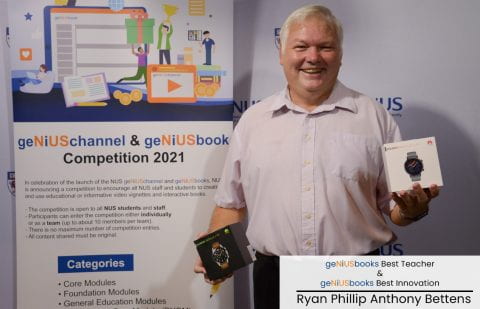
Prof Bettens bagged two awards for “geNiUSbooks Best Teacher” and the “geNiUSbooks Best Innovation”.
Scientific Explanations and Models & The Founding of Modern Science
When Associate Professor Ryan Phillip Anthony Bettens from the Department of Chemistry first started teaching at NUS in 2000, he saw himself more as a lecturer than a teacher, believing that the onus of learning fell solely on students.
Today, Prof Bettens sees it as his job to engage students. It is this engagement – what the students actually do – that “really sinks in and enhances learning”.
“Ultimately, each student must take responsibility for their own learning. But as teachers, we can do a lot to promote and assist them in that,” he explained.
Bagging two awards proves Prof Bettens has certainly been successful in helping his students learn better. His strategy involves adopting different teaching methods and materials to pique and sustain their interest.
After moving his College of Humanities and Sciences core undergraduate module – Scientific Inquiry I – to Microsoft Sway, feedback from his students has been largely positive, with many appreciating the quizzes that come after each learning video to reinforce their learning.
Prof Bettens believes that useful features such as automatic transcription of videos, additional notes and related resources presented logically and attractively in Sway motivate students to learn and engage better with the course content.
geNiUSbooks People's Choice Award

The lecturer-student duo reworked the format of a popular computing textbook to make the learning experience more engaging and immersive.
Interactive SICP JS
To make reading and learning from a popular computing textbook more engaging and seamless, a lecturer and student from the School of Computing teamed up to produce an interactive version of it.
Associate Professor Martin Henz and Samuel Fang Junwei reworked the format of Structure and Interpretation of Computer Programs – JavaScript Adaptation (SICP JS) so readers get to see more than just static figures and diagrams. Instead, clicking on the thumbnails activates the web-based coding plugin within the eBook, which allows readers to directly experiment with and edit the script without leaving the confines of the Microsoft Sway textbook.
This saves them the hassle of toggling between windows and copying lines of code, leading to a seamless and uninterrupted experience that allows them to concentrate on visualising data structures in a more immersive manner.
CITNEWS [ISSUE 01] 2022
Cultivating a generation of self-directed learners: NUS clinches Times Higher Education award for teaching strategy
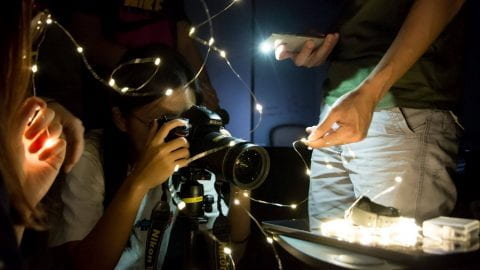
Student-led DYOM modules included “The Art and Science of Photography” (above), “Dialects in Singapore: Hokkien”, and “The Chemistry of Food”.
Two and a half years after the official inauguration of NUS’ Design-Your-Own-Module (DYOM) initiative for undergraduates, the initiative has gained traction and was honoured at the prestigious Times Higher Education (THE) Awards Asia 2021, widely known as the “Oscars” of higher education.
NUS clinched the award for “Teaching and Learning Strategy of the Year”, for the DYOM programme that leverages technology to encourage more independent, self-directed learning among students.
In a statement accompanying the Awards announcement, THE applauded the programme for putting students “at the wheel of their own learning”.
Empowering self-directed learners
Launched in August 2019, the DYOM programme is composed of two tracks, with the option for students to use eight unrestricted elective module credits either in a group or individually.
The programme uses a low-risk “completed satisfactorily” or “completed unsatisfactorily” grading system that gives students the freedom for genuine learning and intellectual exploration without worrying excessively about grades. It instils independence and critical thinking in students and cultivates a knowledge of how to learn that will serve them well as lifelong learners.
One track in the DYOM programme connects students to more than 2,000 massive open online courses (MOOCs) on the edX platform via the NUS learning management system, giving them immediate access to a wealth of expertise from lecturers and academics around the world. These include those from industry-leading companies and top universities such as Harvard University, the Massachusetts Institute of Technology (MIT), Tsinghua University and Kyoto University.

One of the MOOCs offered by NUS was “Data Science for Construction, Architecture and Engineering”, conducted by Assistant Professor Clayton Miller from the School of Design and Environment (now the College of Design and Engineering)’s Department of Building.
The second DYOM track allows students to organise into groups of 10 or more and work closely with a mentor—an NUS faculty member, administrative staff member or industry leader—to create their own modules with hands-on learning experiences in a vast array of subjects and disciplines, including fintech, urban sustainability, fine arts, and more.
The programme not only develops critical skills such as teamwork, communication and flexibility, but offers students the option of pursuing holistic interests outside of their disciplines, the opportunity for multidisciplinary work and an avenue for independent experiential learning.
Undergraduates have also designed initiatives to promote recycling and save the earth.
Popular with students
Since its inauguration, the DYOM scheme has proven popular with students, a testament to the quality of the innovative, enriching learning experience that it supplies. More than 1,800 students completed MOOCs under one option of the programme in 2020, and the number of groups designing their own module with an NUS mentor doubled from eight in December 2019 to 16 in 2020. In total, more than 800 students have benefited from this option.

“It is incredibly heartening for the DYOM programme to have received international and regional recognition so soon after its inception,” said Associate Professor Erle Lim, Vice Provost (Teaching Innovation & Quality). An avid proponent of empowering students and encouraging them to view learning as a self-driven, lifelong endeavour, Assoc Prof Lim has been driving the DYOM and edX programmes, among others.
“The award affirms the effort we have invested into cultivating future generations of future-ready learners, as well as leveraging technology to facilitate flexible, independent learning,” he added. “We aspire to take the programme to greater heights so that more students can benefit from this groundbreaking educational experience.”
The DYOM programme has also received strong and continued support from NUS Senior Deputy President and Provost Professor Ho Teck Hua, the proponent of the initiative. The success is also due in large part to the NUS mentors who have led the students to create their modules, as well as the students themselves for taking the initiative to participate and craft their own educational journeys.
Celebrating educational excellence
The THE Awards, first launched in the United Kingdom in 2005 and undergoing the third iteration of its Asian edition, shines a spotlight on extraordinary educational accomplishments by universities, teams and individuals. It offers a major international platform to honour resourceful institutions which have overcome challenging circumstances to deliver first-class educational experiences.
“It was a genuine privilege to immerse ourselves in these first-hand reports from all corners of the continent, detailing how universities responded speedily and ingeniously, deploying their resources to support students, staff and local communities through a crisis and to help point the way out,” Mr Phil Baty, Chief Knowledge Officer at THE, said in his address at the awards ceremony, which took place in London on 14 Dec and was webcasted simultaneously worldwide.
“Those featured have ensured that higher education has continued to thrive and deliver over the past 18 turbulent months, and we know that they will also be central to the recovery and future development of societies and economies,” he added.
